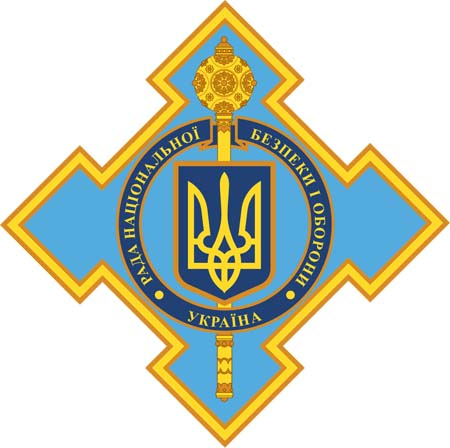National Security and Defense Council of Ukraine
National Security and Defense Council of Ukraine (Рада національної безпеки і оборони України; Rada natsionalnoi bezpeky i oborony Ukrainy or РНБОУ; RNBOU). A top-level national security and defense body under the President of Ukraine. Its functions are to advise the president on policy and to coordinate the activities of the pertinent institutions in times of peace as well as war. Within the RNBOU’s broad competence is the making of decisions (defining national strategic interests, setting policy, identifying threats, and dealing with war and crises) and coordinating their execution; implementing the anti-corruption and anti-oligarch legislation; directing the sanctions regime; and a miscellaneous provision allowing for open-ended jurisdiction. The president is head of the RNBOU and appoints its five ex officio members plus an unspecified number of others, usually key government ministers. The Secretary—also appointed and dismissed by, as well as responsible to, the president—is its day-to-day manager. Ostensibly analogous to the United States’ National Security Council, the RNBOU bears more resemblance to the Soviet-era Politburo in that it has no accountability to the elected national assembly (the Supreme Council of Ukraine) or the Cabinet of Ministers of Ukraine, can bypass both of them, and is capable of becoming a political tool of the president.
Initiated in 1998 by President Leonid Kuchma, the RNBOU came to be used in various unorthodox ways by his successors. President Viktor Yushchenko employed it as a waiting-room for members of the political elite between appointments. He appointed Petro Poroshenko as its secretary as compensation for the prime ministership which he gave to Yuliia Tymoshenko. The latter then complained that Poroshenko was turning the RNBOU into a ‘second government’ (i.e., Cabinet of Ministers). Yushchenko’s solution to the conflict was to fire both individuals. None of the four secretaries appointed by Yushchenko had an appropriate background for the position in security, defense, or international relations.
President Viktor Yanukovych utilized the RNBOU in parliamentary and presidential election campaigns as an additional vehicle for delivering ‘administrative resources’ in support of his Party of Regions. President Petro Poroshenko as far as is known made no inappropriate use of the RNBOU, likely being aware of recommendations by the United States think tank RAND that the agency be given greater responsibility and that informal practices needed to be curbed.
Reliance on the RNBOU as an instrument of government increased under President Volodymyr Zelensky. In 2021, the Council met 36 times, considered 150 issues, and made 90 decisions which were implemented as presidential decrees. These numbers were unprecedented. The practice suggested a reluctance on the part of the chief executive to engage in negotiations with the administrative and legislative branches of government, avoiding democratic contestation in favor of rule by decree.
Domestic sanctions were an extrajudicial measure imposed by the RNBOU on Ukrainian businessmen engaged in illicit dealings harmful to the economy such as smuggling contraband. A former interior minister complained, however, that some of those subject to such sanctions were merely financing the political opposition, an inconvenience for the government of the day. RNBOU could be employed to suppress individual political opponents, actual or potential.
In 2023 Oleksandr Danilov, appointed in 2019, was serving as secretary. Previously mayor of Luhansk as well as governor of Luhansk oblast and a former parliamentarian, his prominence in the media on all matters of public concern made him resemble an unelected vice-president of Ukraine. Its twenty other members included: ten from the Cabinet of Ministers of Ukraine; the Armed Forces of Ukraine’s commander-in-chief; heads of the Security Service of Ukraine and the Defence Intelligence of Ukraine; speaker (chair) of the Supreme Council of Ukraine; National Bank of Ukraine governor; and the president’s own chief of staff. This was Volodymyr Zelensky’s war cabinet, allowing him to make rapid decisions without the delays of democratic procedure, understandable under the circumstances. In March 2024 Danilov was replaced in the post of RNBOU secretary by Oleksandr Lytvynenko, head of the Foreign Intelligence Service. Whether the RNBOU’s dominant role during the Russo-Ukrainian war would continue in peacetime was an important question for the future of the Ukrainian political system, insofar as the securitization of public policy has been a worrisome trend in other democracies at this time.
BIBLIOGRAPHYOliker, O. et al. Security Sector Reform in Ukraine (Santa Monica, California 2016)
Wilson, Andrew. ‘Faltering Fightback: Zelensky’s Piecemeal Campaign Against Ukraine’s Oligarchs,’ European Council on Foreign Relations, Policy Brief (July 2021)
Omel'ko, I. ‘Konstytutsiino-pravovyi status Rady natsional'noї bezpeky i oborony Ukraїny,’ Analityko-porivnialne pravoznavstvo no. 5 (November 2023)
National Security and Defense Council of Ukraine offcial website: https://www.rnbo.gov.ua
Bohdan Harasymiw
[This article was written in 2024.]

